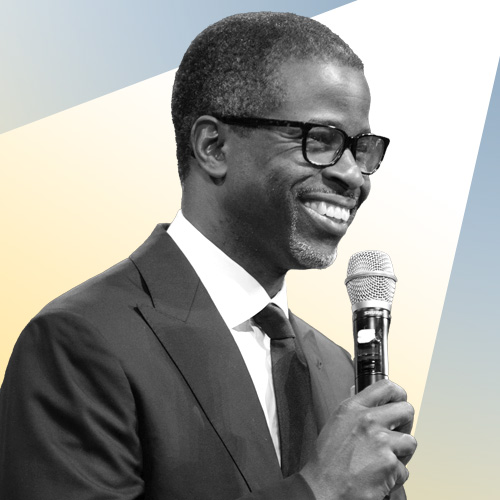When people think of science and faith, they think of conflict: school board wars over evolution, the Big Bang vs. Genesis, medical treatment vs. faith healing.
But in reality, there’s less conflict between faith and religion -- and especially, less conflict between believers and scientists -- than many Americans think, says Elaine Howard Ecklund.
“I think we want to make our congregations places that are friendly to all kinds of big questions, and questions of existential crisis and meaning and science are a part of those for many people,” she said.
Ecklund is the Herbert S. Autrey Chair in Social Sciences, a professor of sociology, and the director of the Religion and Public Life Program at Rice University. She is also a Rice Faculty Scholar at the Baker Institute for Public Policy.
Ecklund launched the Network for the Social Scientific Study of Science and Religion (N4SR) in 2011 and has studied how U.S. religious groups understand science.
She has written widely on the subject, including two books that look at religion and science: “Science vs. Religion: What Scientists Really Think” and “Religion vs. Science: What Religious People Really Think.”
She has received grants and awards from organizations including the National Science Foundation, the Russell Sage Foundation, the John Templeton Foundation, the Templeton World Charity Foundation and the Society for the Scientific Study of Religion.
 Ecklund received a Ph.D. in 2004 from Cornell University.
Ecklund received a Ph.D. in 2004 from Cornell University.
She spoke to Faith & Leadership about her research and its implications for Christian leaders while at Duke to give a lecture sponsored by the Center for Christianity and Scholarship. The following is an edited transcript.
Q: What is the conflict paradigm? Explain a little bit about what that is and how it shapes people’s views of religion and science.
I think it means two kinds of things. First, a kind of irreconcilable conflict between religious ideas and scientific ideas -- [the notion that] religion is about faith and belief, ephemeral things, and science is about reason and things you can see and test.
That kind of framing is pretty pervasive. It shows up in the media. It shows up in science classrooms sometimes. It shows up in other kinds of classrooms in the university more broadly.
The other kind of conflict that I see often in my research is the kind of conflict that shows up as political conflict. Religion and science are not just abstract ideas; they’re also groups of people. There are very real people who are religious people and there are very real people who are scientists, and sometimes those communities overlap.
Certainly, there are religious scientists, and they are in congregations, and that means there are also religious people in science -- in the science community and science institutions -- and sometimes these people groups are in conflict with one another.
A traditional example that we talk a lot about is groups of primarily Christians, but some other groups as well, bringing controversy to school boards about the teaching of evolution and trying to offer alternatives to the teaching of evolution in public schools. One of those is intelligent design, which many scientists think is not really a scientific idea; it’s more of a religious idea.
So there’s that political conflict between religion and science in the U.S.
Q: And you’ve done research into scientists themselves that contradicts the idea that there’s this unbridgeable divide between scientists and believers. Talk a little bit about what you found in your research.
I have two books that might be relevant here. One, published in 2010, is called “Science vs. Religion: What Scientists Really Think.” That is a survey of U.S. university scientists and then follow-up, in-depth interviews with them, where I went into their labs and offices and really talked to them about those issues.
The other book, which was just published in 2017 with my co-author Christopher Scheitle, a professor at West Virginia University, is called “Religion vs. Science: What Religious People Really Think,” where we did a large-scale survey of the U.S. public, then in-depth interviews with certain religious groups and also congregational visits.
A popular public image that’s borne out in my studies is that scientists are atheists. I’ve done surveys of the U.S. public where I ask them to actually describe scientists, and this is a huge descriptor -- that they don’t believe in God. And not just that they don’t believe, but that they are really negative; they’re kind of apostles for nonbelief.
Yet I found through my research that although this voice is definitely the loudest voice, that does not mean it’s the most numerous voice.
About 50 percent of scientists do have some kind of religious perspective. It doesn’t map exactly on the broader U.S. public, but scientists are more religious than we might be led to believe.
And when you go outside universities into everyday people who are scientists -- those who work at research and development and other kinds of scientific careers and occupations outside universities -- they’re about the same as the U.S. public in terms of their levels of religious belief, which is kind of interesting.
I think this is really helpful for Christian leaders to know, because congregants do have this stereotype of scientists, and I think that these kinds of stereotypes can be somewhat dangerous to acceptance of science.
It can be dangerous to youth -- or their parents -- who might choose not to go into science because they think it will be hostile to their faith beliefs. Cutting down those kinds of stereotypes, I think, can be helpful from a ministry perspective.
A second point that has come out in my research is that atheist scientists are different from what we might think.
I think that’s really useful to know as Christians, to dispel our own stereotypes about atheist scientists, some of whom actually participate in religious organizations because they have religious spouses, some of whom see a sense of spirituality and awe and wonder in their scientific work, are very civically minded, and most of whom are not particularly negative toward religious people.
Q: Even though they’re not people of faith themselves.
Yes. Hopefully, [learning this] can prevent or tear down some walls to science that some people of faith might have. It can perhaps encourage religious groups of people, particularly underrepresented minorities in the U.S., those who are black Americans or Latina or Latino Americans, who are massively underrepresented in U.S. science and who are also overrepresented among U.S. Christians.
These are groups in our context who are incredibly likely to go to church. And if they’re hearing things in their congregations or from leaders that are anti-science, we want to break down those impediments and have churches be real sites of science encouragement, and potentially missional places for science education.
Q: Tell us a little more about why this debate or misperception is important for Christians and Christian leaders to address.
I’m often asked by Christian leaders, “Why should conversations about science and church matter in the midst of the great many important things that Christian leaders need to deal with?”
Some of the places and organizations where I’ve given talks about my research, pastoral leaders and other Christian leaders are dealing with very serious social issues, problems of deep pain among congregation members and the need for repair in the broader social world. Why should science rise to the top?
I have three responses. First, we do not want to overly emphasize science in ways that are inappropriate, but research does show that young people often leave congregations because they think that churches are not friendly to conversations about science, are not keeping up with the modern world.
Or they have big questions about the faith that often have to do with science that they just don’t feel safe asking in their churches. I think we want to make our congregations places that are friendly to all kinds of big questions, and questions of existential crisis and meaning and science are a part of those for many people. I think that’s one reason.
I do think also that we want to make our churches places where those in science and science-related occupations feel welcome. And beyond just feeling welcome as people, that they see their work -- I have a project on faith at work with Lilly Endowment Inc. right now, and so I’ve thought a great deal about this -- that they see their work as a place where they can live out a sense of calling and mission. And I don’t think most churches put the careers of scientists into that kind of light.
Science and technology occupations are some of the fastest-growing occupational domains in modern societies, and in the U.S. in particular, and so I think it would be a mistake for our Christian leaders not to reflect on how we might help scientists and those in science-related occupations see those as opportunities for integration and deep mission and calling.
Third, I think there are intense issues of justice that we ought to be reflecting on. Science -- through medicine, environmental care, all kinds of things -- can really help us, can be tools for us as Christians, to bring a kind of hope and healing to the world. So I think we want to foster that kind of reflection in our congregations.
Justice can also in turn help us think about equality in science and see our congregations, especially our largely African-American or largely Latino congregations, as real sites where we can foster diversity in science.
I challenge scientists themselves with this, because the science community doesn’t see church as the first place for education outreach. Right? But what if, for certain communities, those were front-line places? And what if the church leaders themselves were really receptive to this? What would that kind of partnership look like between congregations and universities to advance science and, from a Christian perspective, help people see science as a possible place where calling and mission can be lived out?
Q: When you talk about science, do you mean in general -- a scientific or rational way of looking at the world? Are these sticking points more a difference in overarching worldview or more like “I disagree with this issue”?
Very much a matter of “I disagree with this issue.” It’s interesting, because in these discussions among theologians, philosophers and historians, we tend to see science in the abstract.
But when we study people’s everyday lives, they don’t live science or they don’t live religion in the abstract, as big ideas.
We live them as an interface with medicine and a doctor and a particular diagnosis. We live science in terms of our iPhones. We live science in terms of these very particular kinds of things, and when we see science that way, as about particular forms of science and also particular relationships with people who call themselves scientists and doctors and others in allied occupations, then I think we get some more nuance that’s actually helpful in this issue.
The American public in general is very supportive of science in the abstract, actually. [The problem lies in] the particular kinds of specific scientific issues that have to do with who God is in people’s minds -- God’s existence and God’s involvement in the world.
Scientific issues that Christians in particular have problems with tend to be centered around those two theological cornerstones of the faith.
I think it’s helpful for scientists to know that, because they can teach science in a way that doesn’t really make it seem like science has to do with those issues.
I’m not advocating intense compartmentalization in terms of Christian reflection, of course, but I think a word to the wise for scientists who are teaching these things is, “Don’t overstep the bounds of your science.” “Don’t get into theology in a scientific classroom” is a helpful approach.
In church communities, helping people struggle with how those very deep theological cornerstones relate to science or don’t relate to science -- we can provide a space to discuss those things.
People were fine with evolution, for example, as long as a scientist didn’t say, “This completely proves that God doesn’t exist.” It was the relationship to not only God’s existence but God’s involvement in the world that was the sticking point for certain groups of Christians, rather than the age of the earth or these kinds of things that are commonly talked about.
People actually were much more likely to pick a choice on our survey that was an old earth but also made room for God as the creator of that earth and as involved in the present-day reality of life on earth, which evolution doesn’t inherently say anything about.
So the real issues were those theological issues, rather than the science, and I think that was just really useful to think about in terms of practical ministry.
Q: It’s probably a very deep assumption of people of faith that scientists are atheists or hostile to religion. What could Christian leaders do to address this misperception?
My co-author and I, Christopher Scheitle, inserted a little experiment in our survey where we asked if Richard Dawkins is typical -- he’s the author of “The God Delusion,” who held the chair in Public Understanding of Science at Oxford and is of course a real outspoken atheist scientist. And they thought Richard Dawkins is incredibly typical.
But when we actually surveyed scientists across a wide variety of national contexts and even in Dawkins’ own U.K., [we found that] he is not typical even for scientists who are themselves atheists.
I think just showing congregants this kind of data is helpful. That’s a place to start, and then I think second- and third-level conversations might deal with encouraging scientists in the midst of congregations to feel like they can talk more openly about their science.
I think it’s good for the scientists, but other research also shows that people change their minds through relationships with people that they know and trust. So if you have a scientist who is also the worship leader in your congregation, for example, this may be a person who is trusted as a fellow congregant, as a fellow person in the pews, and then their science might be made to seem more accessible as well.
I think that it’s incredibly important to get scientists who are Christians in front of youth. People who work with youth in Christian ministries are an incredibly important group of leaders for the future of the church. [So we might think about having science-related gatherings] where kids feel comfortable asking questions and then teaming groups of congregations together to address these issues.
Some congregations are filled with more highly educated people, are more likely to have people in science and medicine occupations; some congregations less so. What would it mean to give the resources of our congregations to each other? Maybe, as Christians, we want to think outside the box on this issue in particular in terms of a sharing of resources.







